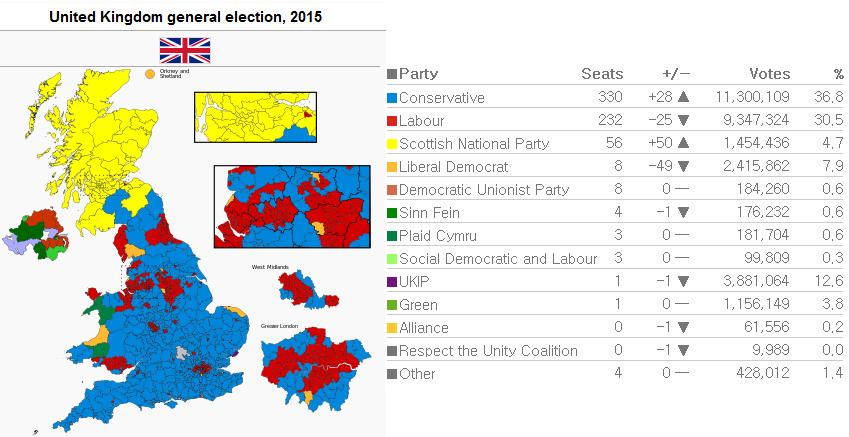Every pre-election predicted a “hung parliament” (no party having a majority), with Labour probably able to govern in coalition. One poll even put the odds of a hung parliament at “100%”. All wrong. The Conservative Party won an outright majority of seats.
The other big story is the “sweep” of Scotland by the left-wing Scottish National Party, which calls for Scottish independence. This is the first election in which they have done so well. The result must be a carry-over of political energy from the failed independence referendum of 2014
(see posts #228, #229, and #233). Anyway, the polls got the Scottish result right. It was predicted they’d win nearly every seat in Scotland and they did.Given the opinion polls all predicting a close outcome, there was much talk in England, it seems, of the “anti-British, far-left” Scottish National Party becoming junior partners with the Labour Party in a new coalition.
This would inevitably lead to a “Scottish Tail Wagging the Labour Dog” situation in parliament. And what a strong tail it would be. The SNP is aggressive and goal-oriented, while the Labour Party seems to me to be limping along on political inertia from decades ago, generations ago. It seems to lack a clear vision or purpose. Britain is no longer some kind of old-style Oliver Twist industrial economy. What is the purpose of labo(u)r politics? Today’s Labour Party seems to be all about maximizing welfare handouts. This calls to mind the classic criticism of democracy made since ancient times. A party much more disciplined, focused, and relevant in today’s world, the SNP, would exert a huge influence on a Labour government. (I say all this as an outsider who has never even been to the UK, of course.)A Labour-SNP coalition ruling Britain would be a humiliation for England, akin to a kind of foreign occupation. Millions of English voters shifted their votes to the Conservatives, given this prospect. A full 600,000 more votes were cast for the Conservatives in 2015 than in 2010, but this is magnified much more when taking into account that the Conservatives lost a lot of their own right wing (probably over three million) to the UKIP party (often called a UK version of the USA’s “Tea Party,” which calls for the UK’s immediate exit from the EU). This means millions of English votes shifted to the Conservatives from other parties.
The two decisive turns in the election (the rise of the SNP and the rise to majority status of the Conservatives) are both, probably attributable to local nationalism.
The rise of UKIP, which got an amazing four million votes of 31 million cast when almost none of its candidates individually stood a chance (“throwing your vote away”) is also clearly attributable to a kind of rising nationalism.Following the election, a British journalist specializing in the Middle East, Patrick Cockburn, wrote an article about this, “Modern States are Fragile in the Face of Local Nationalism” (Originally published in The Independent):
Knowing [Middle Eastern] countries has given me a strong sense of the fragility of nation states when confronted by strongly rooted local nationalisms. The glue holding together nations is always a mixture of myth and self-interest which tends to become ossified and discredited over time. [….]
The triumph of the Scottish Nationalist Party on Thursday and the annihilation of all other parties in Scotland has led to lamentations on left and right over the likely passing of Great Britain as a unitary state. There are panicky whiffs in the air as people who had scarcely noticed there was such a thing as the union between England and Scotland come to realise that it may soon be dissolved and wonder what the future will hold. It is ironic to recall that a decade ago British officials talked glibly about “nation building” in Afghanistan and Iraq, without a thought about the staying power of their own nation. [….]What is striking about the coming dissolution, be it partial or total, of the British state is the lack of resistance to this from its political establishment. It is but one more element in the decline of British power in the world over the past decade. [Continues]
I can say that I think I do understand the principles at work behind what Cockburn calls “the coming dissolution, be it partial or total, of the British state”. All the same ingredients exist in today’s USA!

